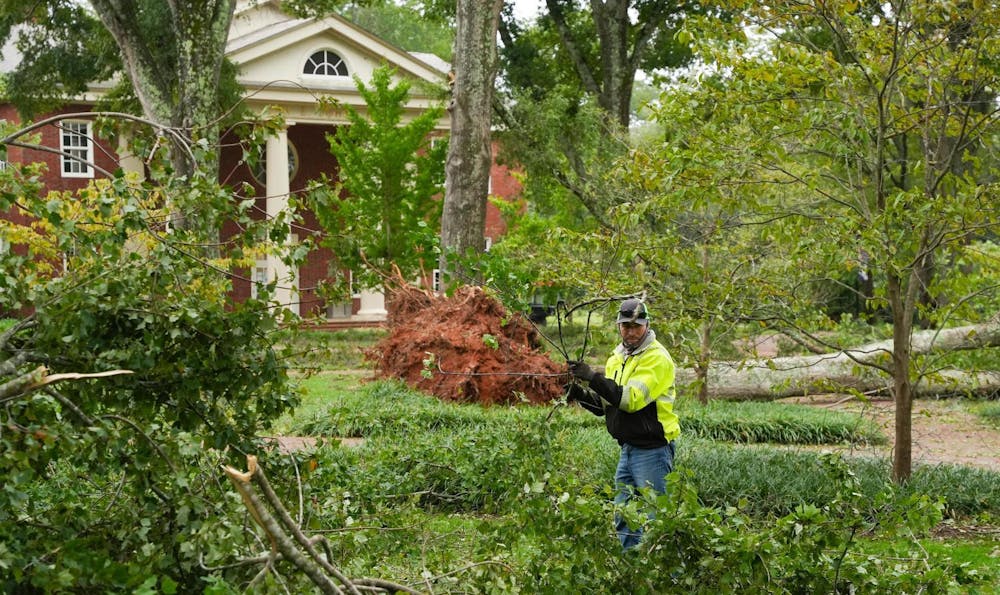As an international student from Liberia, Furman University student Roger Abim-Karmon remained on campus for the entirety of the aftermath of Tropical Storm Helene.
“I've never had anything like this happen back home. It was an interesting experience. I've only seen this on TV. And seeing things on TV and then having the reality of it is very different," Abim-Karmon said.
Beginning on Monday, Sept. 24, the Greenville area surrounding Furman’s campus was inundated with rainfall of just under 4 inches before the bulk of Hurricane Helene hit. The already moisture-packed soil contributed to significant damage in the area, leaving trees less secure and many areas more prone to flooding.
Once the storm reached the area overnight on Thursday, Sept. 27, the rainfall totaled 11.3 inches. Coupled with the up to 68 mph winds, many trees were knocked down and homes were destroyed throughout campus and the surrounding area.
“I thought it was gonna be minimal damage, and we're just gonna get things done until Thursday. I think Friday was when it hit. (I realized) this was actually a very big deal. When power went out, and we lost the cell service, I couldn’t let my family know that this was happening,” Abim-Karmon said.
Nearly 260,000 were without power in Greenville county, including Furman’s campus for five days, leaving students without hot water, typical dining options and cell service. Many roads were impassable due to fallen trees and power lines, especially those in and around the campus. Additional damage on Furman’s campus included large amounts of debris, flooding and damage to student housing and campus infrastructure from downed trees.
Classes at Furman were canceled from Friday, Sept. 28 through Friday, Oct. 4, leaving students without knowledge of deadlines or syllabus changes. It was until that latter Friday when Wi-Fi was fully restored in student housing.
Although many students chose to leave campus during this period, some were not able to because of travel complications such as road closures and power being out at their homes as well. Students that stayed received power and Wi-Fi through the Physical Activities Center, the dining hall and at the Furman Police Department with the help of external generators. The Student Government Association also planned several impromptu events for students on campus, including when Dr. Jason Hansen of theHistory department brought an RV with a generator to the library steps for students to charge their devices.
“FUPD was a huge help because they had electricity and Wi-Fi. I was going there at 9 or 10 a.m. to get my stuff charged and chat with the officers. That was a really good experience,” Abim-Karmon said.
Many students, like Abim-Karmon, did not anticipate the severity of the disaster, thinking it would be no bigger than a typical storm. What they received from the university with the notice of cancellation of class on Sept. 28, with an email to students and faculty the day before the storm that it was a “major storm that is expected to cause significant damage.”
The university was still scheduled to have their annual Family Weekend on Sept. 29, and stated in the same email that “Helene will cause disruptions and inconveniences as families travel to campus for Family Weekend.”
In the aftermath, students had access to limited dining options from the dining hall. The Furman staff played a significant role in maintaining services and support for students on campus. The dining hall workers cooked meals using gas grills outside to keep food available as much as possible.
“At the end of the day, I think throughout my experience with staying on campus, it was good to know that I wasn't in it alone, because we have staff working overtime. They were amazing,” Abim-Karmon said.
Despite the overall destruction and tragedy that Helene brought to the region, Abim-Karmon found silver linings in the circumstances which he and other students faced.
“The hurricane was a good way to be outside and think through what's happening, because a lot of people were outside. No one had electricity or anything, so everyone's socializing. I made new friends and got to learn how to play pickleball for the very first time. As much as a lot of people were affected by Helene, staying on campus made me feel connected more to Furman and the people at Furman,” Abim-Karmon said.
Many students on campus, like Abim-Karmon, used the time away from their studies to pour back into the community around them. For example, the administration organized events for students to make toiletry kits for linemen staying on the campus, which had a high student turnout.
“We volunteered with iFACE in Greenville which helps international students in the United States. They did a lot with helping people who needed it or were affected by the hurricane. So volunteering with them was also another good experience,” Abim-Karmon said.
Abim-Karmon found that the hurricane offered an opportunity for the Furman community to reflect on what happened and how to respond better in the future.
“I think we can use Helene as a way to strategize in terms of how our students can receive help in these times. We need to know this is coming, and based on past experience, we can put mechanisms into place to make sure students who live very far can get the time to go home, or for students who cannot actually go home to have good resources to help them throughout the experience. But in the future we might still be affected by this experience, regardless of what happens,” Abim-Karmon said.

